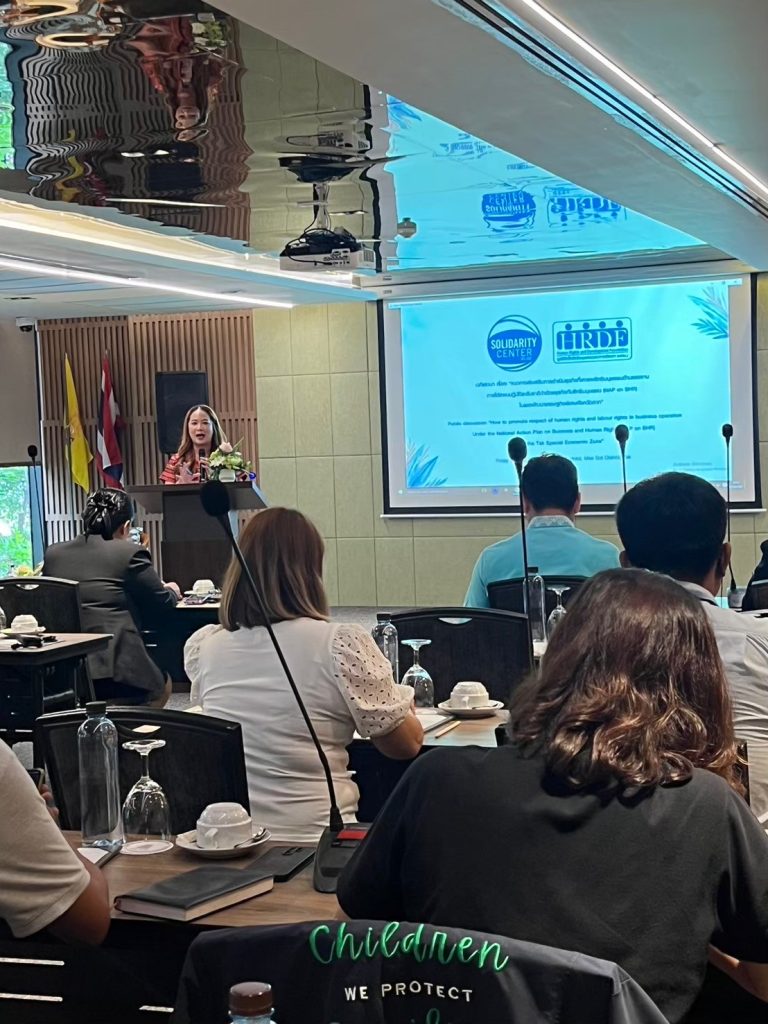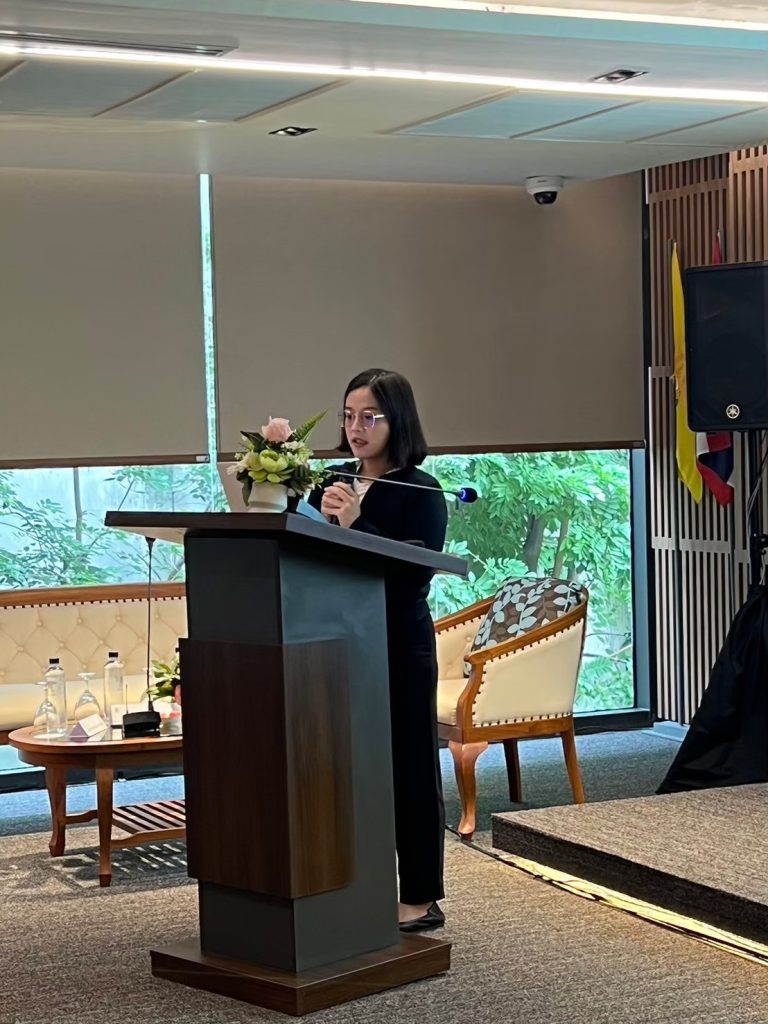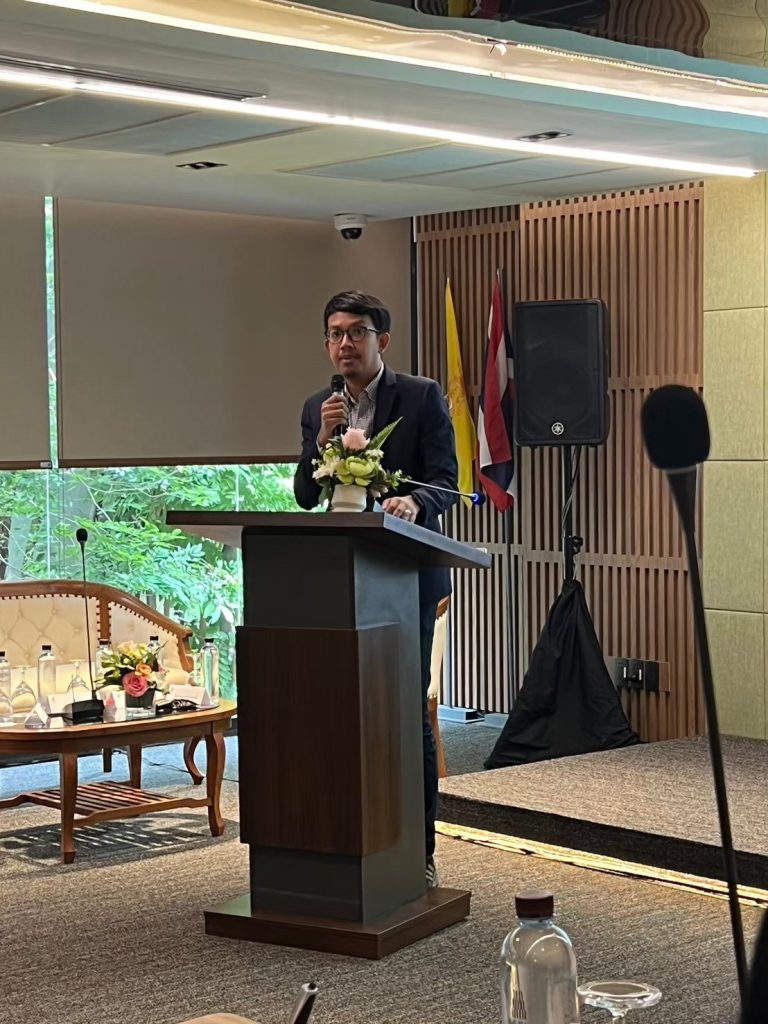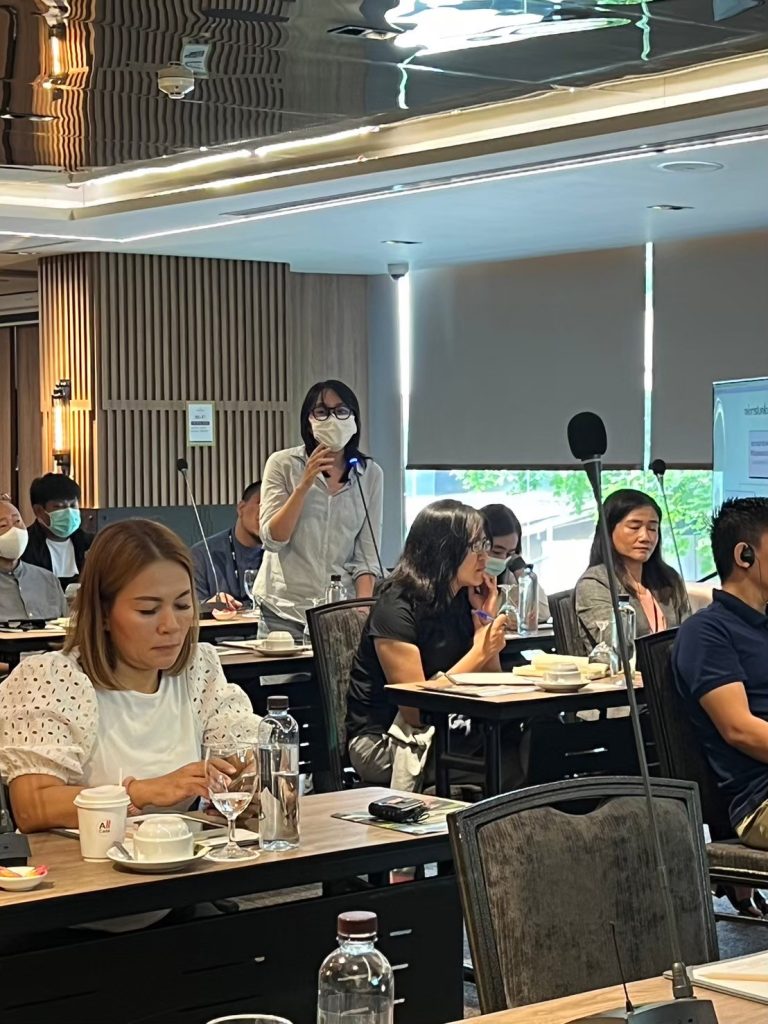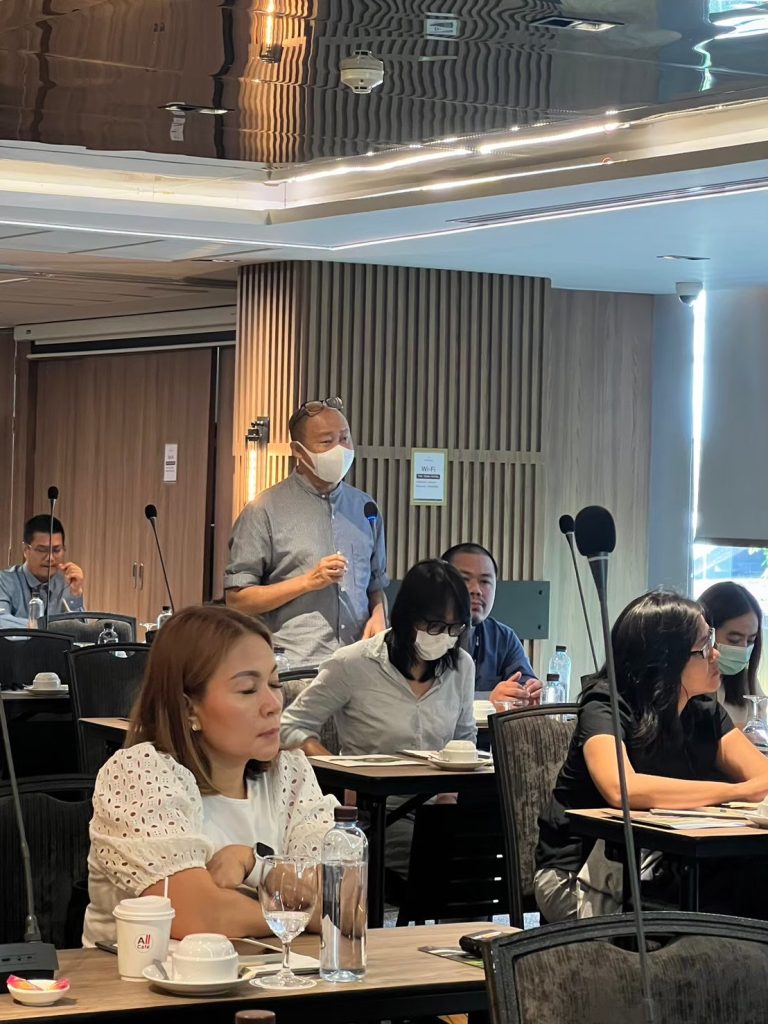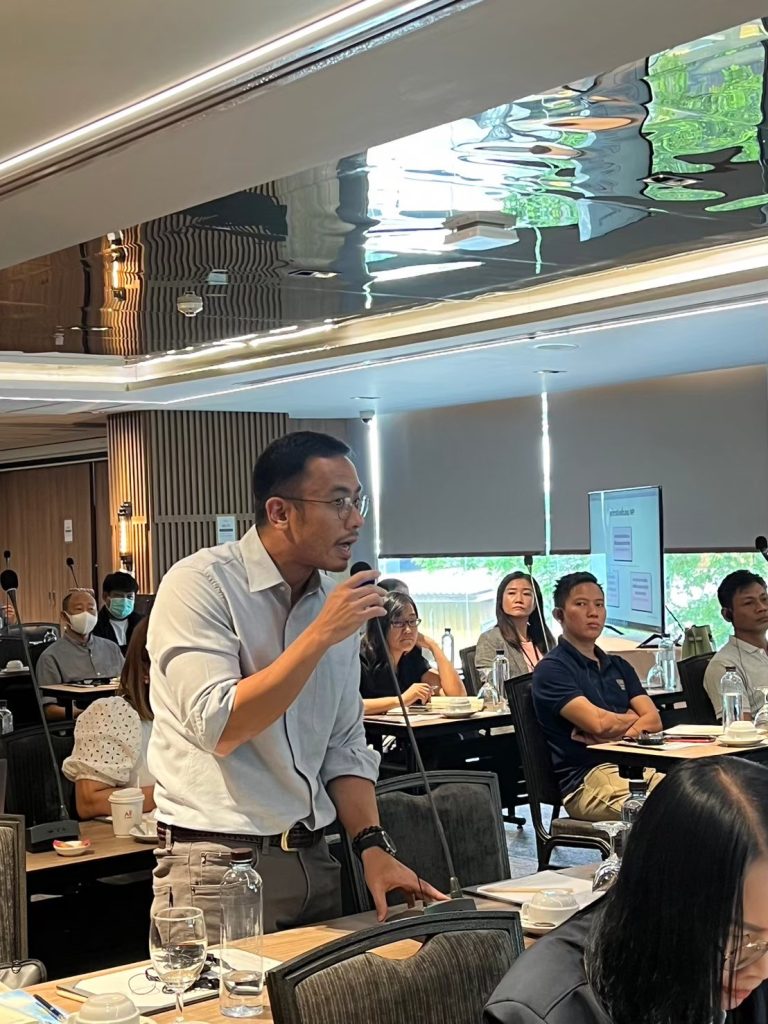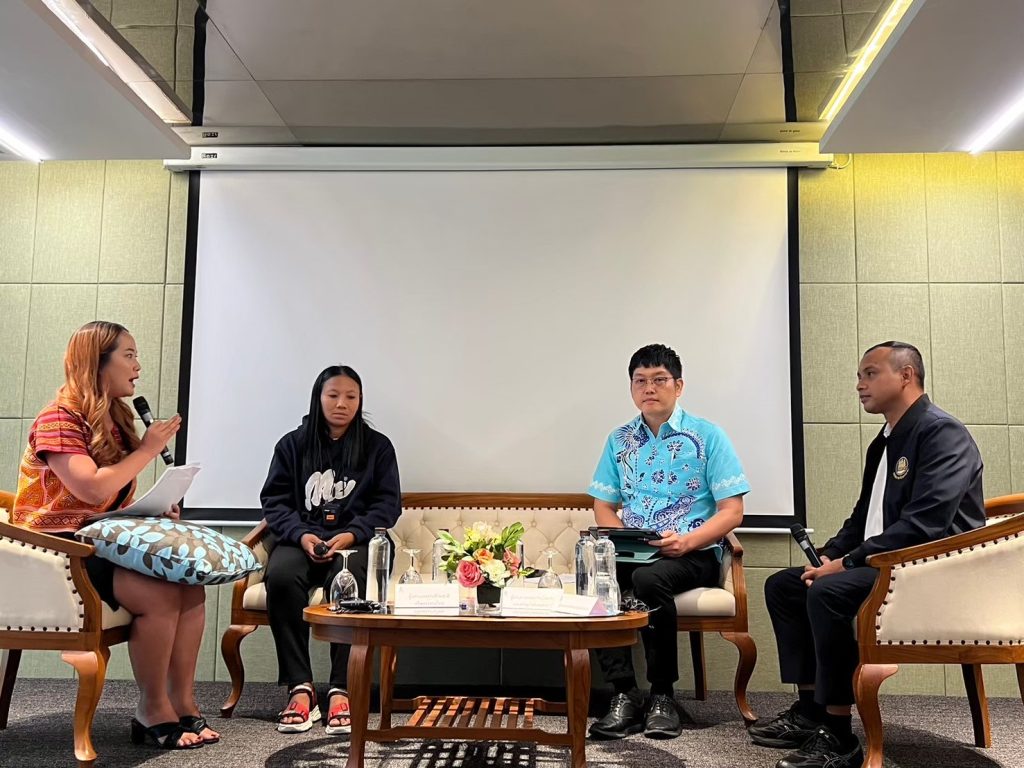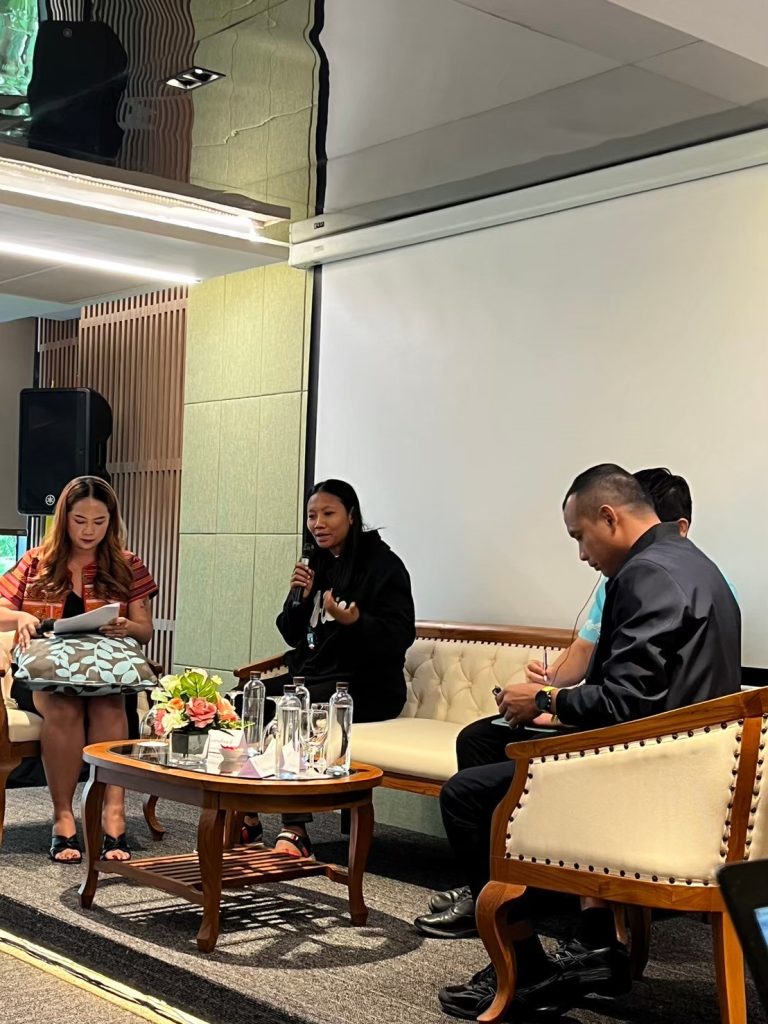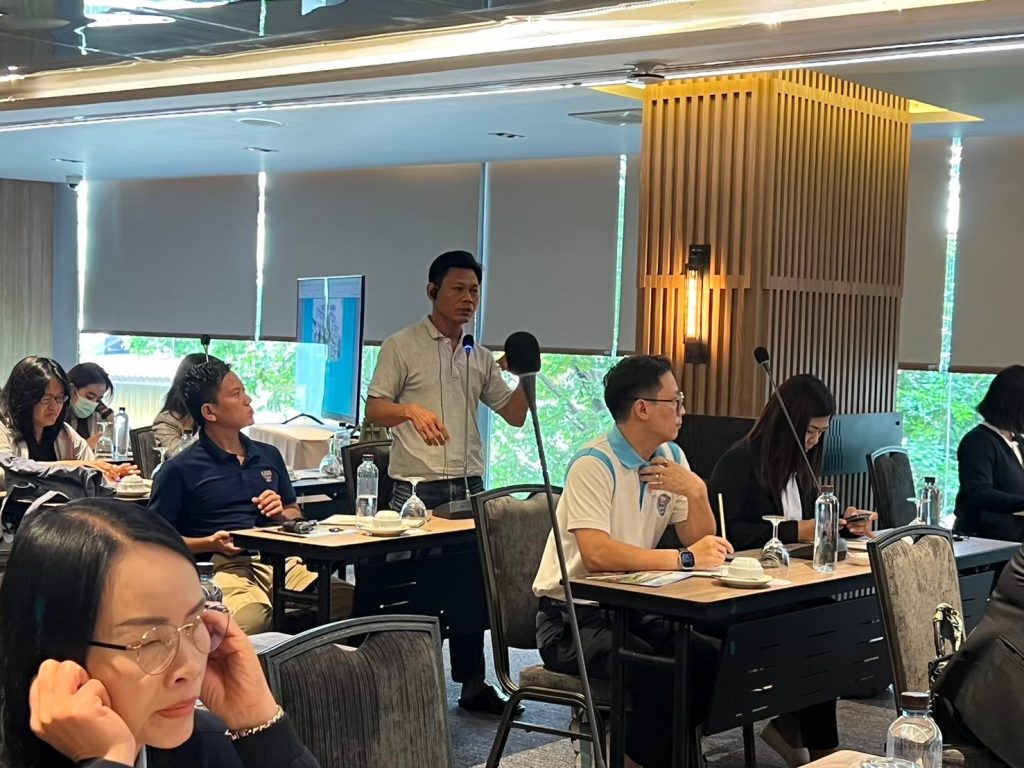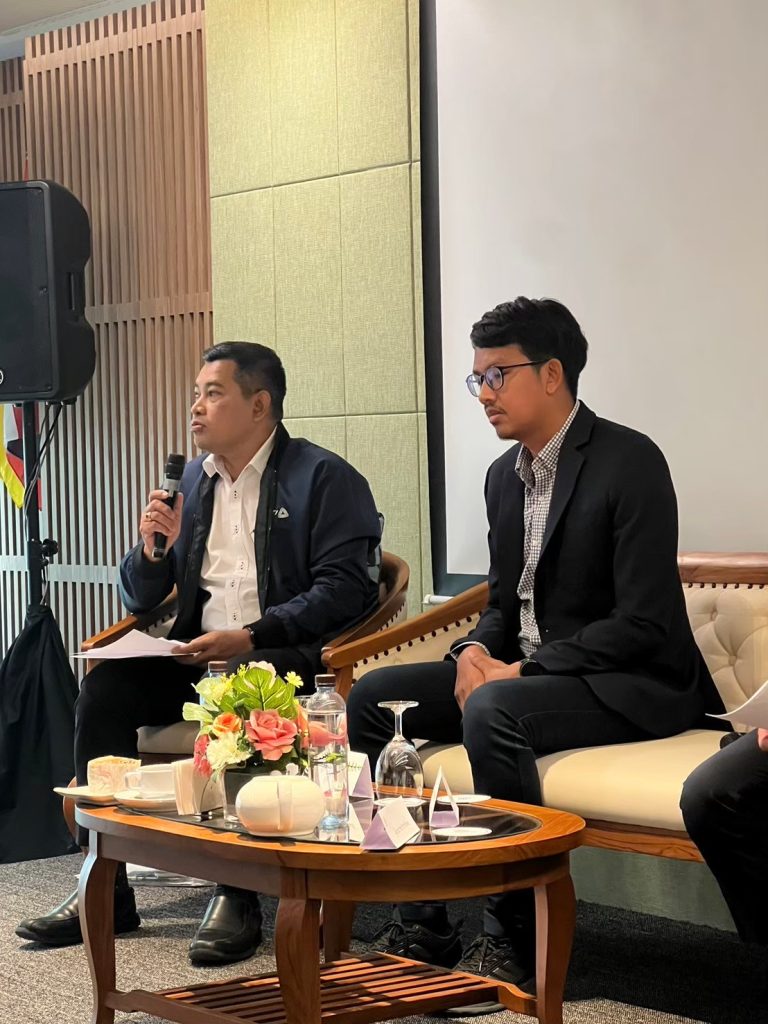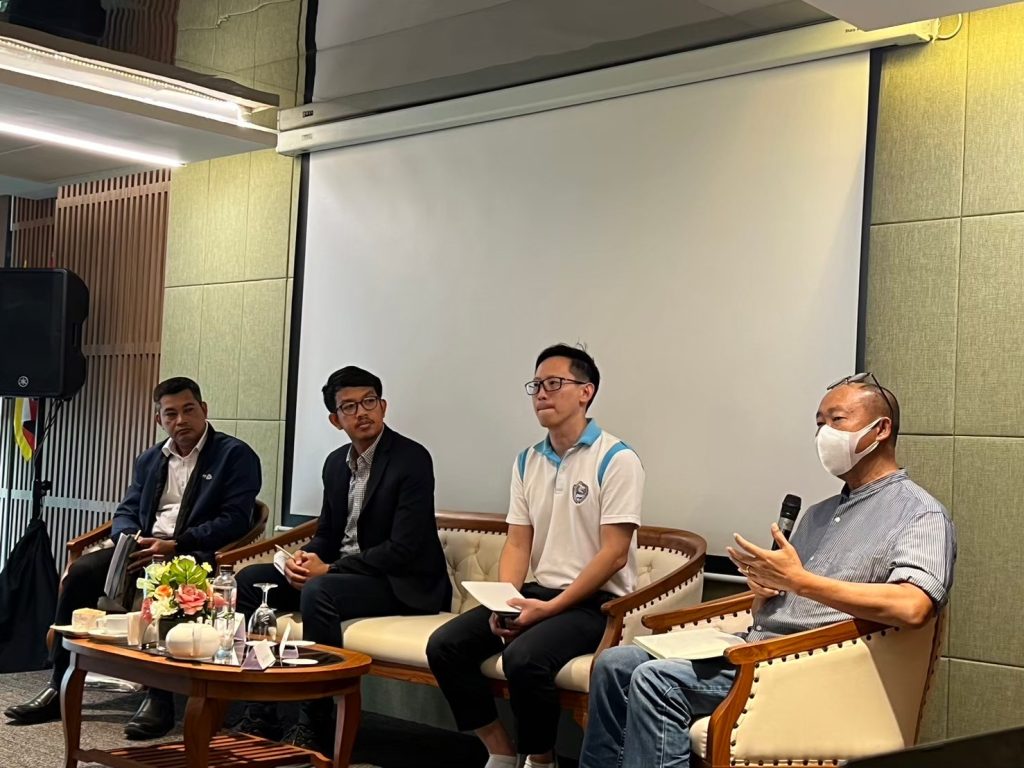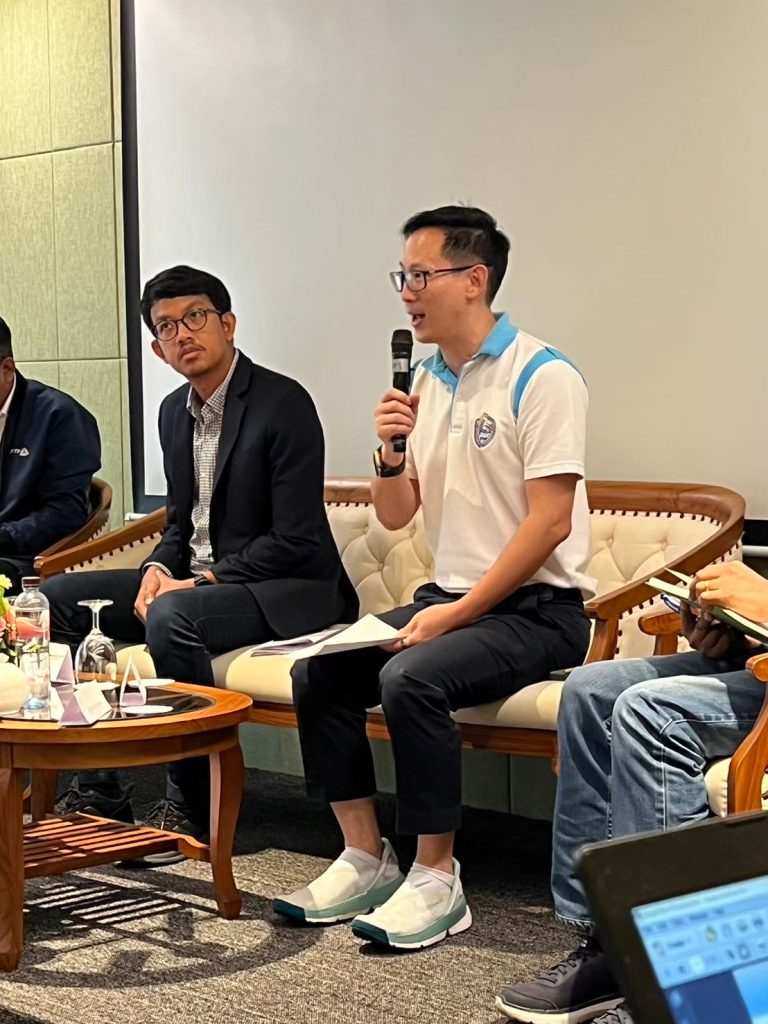Summary of public discussion “How to promote respect of human rights and labour rights in business operation under the National Action Plan on Business and Human Rights (NAP on BHR) in Tak Special Economic Zone

On 31 May 2024, at The Teak Hotel, Mae Sot District, Tak, Human Rights and Development Foundation (HRDF) and allied organizations organized a public discussion on “How to promote respect of human rights and labour rights in business operation under the National Action Plan on Business and Human Rights (NAP on BHR) in the Tak Special Economic Zone” with key discussants including Anon Youngkhun, Chief of the Systemic Development and Establishment of International Human Rights Assurance Group, International Human Rights Division, Rights and Liberties Protection Department, Ministry of Justice, Sarawuth Eamsa-ard, Plan and Policy Analyst, Professional Level, Strategic Work and Information for Provincial Development Group, Office of the Tak Provincial Authority, Theerachai Wimon, Labour Specialist, Professional Level, Tak Office of Employment, Chalermwat Triratwattana, Vice President of Tak Chamber of Commerce, Suchart Trakoonhutip, Coordinator of MAP Foundation, Wutthinan Petchsringern, representative from Tak Federation of Industries. And representative from migrant workers in Mae Sot District, Tak. The seminar aims to present the importance and to engender understanding of the 2nd National Action Plan on Business and Human Rights for 2023 – 2027, to provide a space for exchange of ideas among concerned stakeholders with the effort to protect, promote and remedy among concerned authorities, employers, workers and civil society to explore further cooperation, and to brainstorm on ideas that may lead to the development of proposals to promote responsibility and respect of human rights among businesses.
“I want Thailand to adopt a central law to promote business sector, a mandatory law. I’ve heard that the EU has adopted a law to mandate HRDD of their supply chain and Thailand is certainly required to act in its compliance if we want to export there. If a law is adopted to promote respect on human rights in the business sector, or a measure to incentivize them, to ensure they get something in return, it may encourage business sector to genuinely respect human rights” saidAnon Youngkhun.
Anon Youngkhun, Chief of the Systemic Development and Establishment of International Human Rights Assurance Group, International Human Rights Division, Rights and Liberties Protection Department, Ministry of Justice said that the issues of business and human rights have become prominent thanks to Thailand’s commitment made during international forums and how it is necessary to pay attention to impacts from business sector. Therefore, the United Nations (UN) has asked experts to develop a mechanism for prevention on business and human rights. Such mechanism is the United Nations Guiding Principles on Business and Human Rights (UNGPs) composed of 31 principles which have been established since 2011. There are three keywords underpinning UNGPs including (1) Protect, (2) Respect, and (3) Remedy. According to the principles, states are obligated to offer protection. It must protect the public against human rights violation. It also requires state enterprises and business sector to conduct their business operation based on respect of human rights. Lastly, remedy, states are required to ensure such respect in the business sector under the incumbent business operation, human rights violation continues to persist. It is important that remedies be offer to offset such emerging impacts. It is incumbent on states, state enterprises and business sector to remedy the emerging impacts, financially and mentally. The three keywords; protect, respect, and remedy.
In 2016, realizing the importance of the promotion of responsible businesses and respect for human rights, Thailand accepted recommendations and offered pledges during the second Universal Periodic Review (UPR) to carry out our duties concretely. It has led to the development of the National Action Plan on Business and Human Rights (NAP). The Thai government has asked the Rights and Liberties Protection Department, Ministry of Justice, to prepare the document. In 2019, Thailand thus adopted the first NAP (2019-2022) officially. Such announcement made Thailand the first country in Asia to adopt an action plan on business and human rights which applied to various sectors. The initial NAP focused on four issues, L.E.D.I., to resolve including (1) labor, (2) community, land, natural resources, and environment, (3) Human Rights Defender, (4) international investment and multinational corporation.
As the first NAP has expired, the government proceeded to adopt the second NAP (2023-2027) for five fiscal years. Its design was informed by study trips made to hear from concerned authorities, analysis through national mechanisms including the National Human Rights Commission to explore the desirable second NAP. It is composed of two main sections in compliance with the UNGPs. Its first section deals with the state’s obligations. The state is compelled to deal with business operation and to invoke its power through cabinet resolutions. Power shall be administratively invoked to encourage concerned state agencies to encourage, supervise, and monitor agencies under its charge to ensure their implementation including among state enterprises and business sector. At present, the NAP 2’s measures are still adopted on a voluntary basis, not mandatary to state enterprises and business sector. It can simply advise and encourage business sector as to what they should do and expect that the business sector shall become responsible organizations and respect human rights and what they have to do in compliance with the NAP.
The recommendations from Anon from the Rights and Liberties Protection Department, Ministry of Justice involve three aspects;
- Legislation: Questions were raised by civil society attending the forum as to why we can simply ask for voluntarism from business sector, doesn’t the Rights and Liberties Protection Department have the mandate to issue them instructions? Do they simply have to seek cooperation from the state authorities to carry out such duties according to the law within the mandate of the RLPD? Personally, he wants a central legislation to be adopted to encourage and to mandate business sector and an effort can be made to explore how the European Union (EU) can impose legal requirement to carry out the HRDD while Thailand serves as a supply chain of the European business sector. Therefore, in order to maintain its competition, the business sector is required to act in such compliance, if they still want to export their products there. But if Thailand adopts a law to specifically encourage business sector to respect human rights, or to adopt measures to incentivize them making sure they get something in return. This may help to encourage genuine respect for human rights in the business sector.
- Policy: Thailand should adopt measures to advocate for mechanisms at the provincial level to address local issues, i.e., in Mae Sot District, Tak, whose issues could be uniquely different from other areas. The involvement of all sectors shall lead to the effective solutions at the local level.
- Operation: It is important to engender understanding and equally important for everyone to be able to speak out about the problems. Each unit has different facts and they should be brought together to explore collectively the solutions in Mae Sot District and how every sector can coexist based on mutual respect of human rights.
“The Mae Sot Special Economic Zone District is a special area established by the government to incentivize investment. An importance is place on using migrant workers locally to promote economic integrity. Labour is instrumental as the driver of Thailand’s economy. In particular, we have to rely on the use of migrant workers, not Thai workers. For the Tak Special Economic Zone, the Myanmar workers play an important role to drive the Special Economic Zone” said Sarawuth.
Sarawuth Eamsa-ard, Plan and Policy Analyst, Professional Level, Strategic Work and Information for Provincial Development Group, Office of the Tak Provincial Authority addressed the overview of the Tak Special Economic Zone which covers the area of over 800,000 rais and is located in three districts and 14 Tambons in Mae Sot District including three Tambons in Mae Ramat District and three Tambons in Phop Phra District. At the national level, it is subject to the supervision of the National Committee for the Development of Special Economic Zones chaired by the Prime Minister with the Office of the National Economic and Social Development Council (NESDC) as its secretariat to determine all the concerned policies. Therefore, there is no local supervision authority. No policies are designed at the local level concerning the Special Economic Zone. There is only an implementation committee in each area of Tak Province and the Tak Committee for the Development of Special Economic Zones chaired by the Provincial Governor with the Office of Provincial Authority as its secretariat to link up between the provincial and national authorities without mandate to determine policies. They can only ensure proper implementation as planned.
“ Key issues concerning migrant workers in Mae Sot District are (1) the employment policy concerning local migrant workers including the commuter or seasonal migrant workers as mutually agreed. We have to tune up well. If we want to draw in such labour while in Myanmar, there are problems regarding their laws and local issues. This makes it difficult for discussions to happen. There seems to have been no compliance with the Thai law including about wages. The workers, of course, want to be paid properly. If they work in Mae Sot District, they may receive 300 baht, but if they get to Bangkok, it may increase to 400 baht. As a result, the workers want to work where they are properly paid” said Sarawuth.
As to labour issues in the Tak Special Economic Zone, the state has made several preparations including the infrastructure, the provision of benefits, etc. An effort has been made to promote the employment of local migrant workers and to provide security to ensure alien workers can work primarily in the border area, and not to flock to the cities. This makes it easy to manage. And they are required to commute to work. The Ministry of Labour has invoked Section 64 (of the Foreigners’ Working Management Emergency Decree B.E. 2560) to allow an employment in eight provinces along the border and the workers are allowed to use Border Pass, in lieu of passports, and are allowed to work up to 90 days. They will receive training and unskilled workers are offered health insurance and social security.
“It is difficult for workers in agricultural sector to get registered invoking Section 64 given the nature of agricultural work and the geography in Thailand which is easy for them to get across and employed. It is therefore difficult for them to get registered under Section 64. They may get across at the first bridge in Mae Sot, but opt to work at the second bridge, or in Phop Phra District, or Mae Ramat District. It is difficult for them. If they get registered properly, and the timeframe or the methods of registration are set out properly, we will be able to control their employment” said Sarawuth Eamsa-ard.
Sarawuth wrapped up by saying that the work concerning migrant workers along the border in Mae Sot District has to heavily involve with the authorities in Myanmar. The political situation there has the ramification on the implementation of concerned policies. Even though Mae Sot can attract a lot of investment and is home to a Special Economic Zone which manufactures and exports to around the world, but the minimum wage in Mae Sot District is relatively low. Meanwhile, there has been a drop in the importation of migrant workers and this has taken its toll on the manufacturing sector. The entrepreneurs have to get adapted to the current economic situation where local manufacturing capacity is in a decline, and thus the decline in the number of workers. Lastly, regarding employment policy, there have been inconsistencies in terms of the invocation of Section 64 to issue work permits to holders of border pass. The work permits issued by the Department of Employment (DoE) invoking Section 64 can last for three months, although the workers are required to report themselves every 30 days. It has been proposed if this can be extended to 90 days, or not since it can help to save time for the workers. This is one of the demands from local area. Section 64 involves an international agreement and applies only to residents of Myanmar’s cities adjacent to Thailand and three districts in Tak including Mae Sot, Phop Phra, and Mae Ramat Districts. But according to the regulations in Myanmar, this only applies to workers from Myawaddy. This is incompatible with the need of labour in several areas along the border. Many employers always complain that their employees have not come only from Myawaddy, but from inner areas of Myanmar as well. These people also want to work in Thailand. Given the incompatibilities of the laws and the international agreement, the problems become complicated and they cannot be unilaterally addressed by Thailand.
“The employment invoking Section 64 should be expanded to Umphang and Tha Song Yang Districts as well. And the procedure concerning Section 64 should be made easier for workers in agricultural sector, or for the duration permitted to live equally to the duration of work permit” said Theerachai.
Theerachai Wimon, Labour Specialist, Professional Level, Tak Office of Employment said that various problems concerning Section 64 have been long in existence vis-à-vis the border employment measures. The problems in Thailand have been discussed to seek solutions among various concerned authorities and other agencies. But the problems are complicated since Section 64 has been invoked to strike deals with Myanmar and according to the contracts, any alteration made to the contracts have to be made only through diplomatic channels. The Ministry of Labour cannot unilaterally made such alternation. It requires the Ministry of Foreign Affairs to sign on as well. Therefore, such solutions have to be sought through an international agreement. The employment invoking Section 64 should be expanded to the area of Umphang and Tha Song Yang Districts as well. And the procedure concerning Section 64 should be made easier for workers in agricultural sector, or for the duration permitted to live equally to the duration of work permit. In last April, the Department of Employment (DoE) has invited agencies under the Ministry of Foreign Affairs, security agencies, and the Foreigners’ Working Management Policy Commission to listen to problems and solutions as well as recommendations from the provinces of Tak and Srakaew regarding the proposed addition to menial work, domestic work and retail work for migrant workers since Srakaew is home to Rong Kluea Market. In Mae Sot District, there is a proposal to extend the duration under Section 64 to six months as well.
“The employers are concerned that if the migrant workers are given proper documentation, they will move to work in inner area causing labour shortage. The employers already suffer from shortage of Section 64 workers, and shortage of labour imported through cabinet resolutions. Once, they have the documents, they can travel to work anywhere. As a result, the employers are reluctant to apply for them their personal documents” said Theerachai.
Theerachai addressed key issues including the brokers or the employers who are reluctant to renew permits causing the alien workers to live illegally. According to the employers in Mae Sot District, they claim that the largest number of workers are those recruited through the cabinet resolution. The employers are concerned about these alien workers since when they acquire proper documentation, they may travel to work in inner areas. As a result, the employers are reluctant to apply for them their personal documents, and thus the renewal of work permits in Mae Sot District is the lowest as a result of their concern. Both the Chamber of Commerce and the Federation of Industries want to advocate for the application of Section 64 like before, to import workers since the approach is most suitable for border area. There have always been discussions about the gaps for the application of Section 64 and the management of border employment among agencies. Theerachai said that he used to pitch an idea with his superior officials to designate Tak as a special point where the Provincial Registrar is empowered to take charge and exercise Section 63/2 to promote employment in the province. But in reality, such implementation by the Department of Employment (DoE) will hit a legal snag and may not be practical for local enforcers. Therefore, there is yet to a concrete effort to address the issues in Special Economic Zones regarding the employment related to Section 64.
“The Department of Employment (DoE) may solve the problems by invoking Section 63/2 to launch a new registration of workers. But it is not easy to open each round of such registration since the agenda has to be tabled for meetings and approved by the cabinet for each round” said Theerachai.
The launch of each registration of workers has to go through procedure and acquire approval from the central government. Therefore, looking at the overall picture of the country, it is not only that the Ministry of Labour has to promote employment to bolster the economy, there are issues of concern regarding national security, social crime, public health, and other concerns. Therefore, it is not easy to launch a new registration. Still, the Ministry of Labour has managed to launch a new registration every year and the workers have to wait for each registration, maybe once a year, or twice a year, for one month when the illegal workers are allowed to get registered and become legal. The government has no policies to encourage the incoming of new migrant workers. They tend to cater to the existing illegal migrants to allow them to legalize their status. But we do not support the migration to work in Thailand. It can be noted that the Ministry of Interior’s and the Ministry of Labour’s Notifications are always focused on existing workers who already work with their employers in Thailand. As to the proposed launch of service centers to help the incoming workers, or for coordination, what we can do now is to instruct the existing subdivisions of offices to address the workers’ problems, to offer them advice on how to apply for work permit or to work in Thailand. There can only be initial service centers, not the one stop service.
“If the employers offer us our basic rights according to the labour law, we would not want to travel anywhere since Mae Sot is located close to our home country. It is easy for us to commute” said a migrant worker from Mae Sot District.
Representative from migrant workers in Mae Sot District said that the protection of labour rights for workers in Mae Sot District is not equal to the protection afforded by workers in Bangkok and other areas in Thailand, i.e., unequal wages and benefits, etc. Even though this area is home to the manufacturing of exported products and there are safeguards through reporting of information, but when auditors are sent here to review labour rights violation incidences, they always say there is no problem here, due to lobbying effort from the employers. The inspectors hardly see any problem here. Even though we do not receive 300 baht for our wage, but we are forced to sign the form to admit to receiving the minimum wage. The employers can then show the papers to the auditors. Once, the migrant workers got to talk directly with the auditors about their having not receive the minimum wage, and the auditors promised to help us. After the auditors were gone, the factories called a meeting and asked why the workers did not speak as planned. And they had us sign new documents. This incidence probably happens in several other factories in Mae Sot District as well. In addition, when the migrant workers get into any dispute, they often have their work terminated and cannot land a job elsewhere since according to their records, they have been involved with raising the demand for justice or fighting for legal rights protection.
“I am quite confident that nongovernmental organizations which work closely with the workers have clear information as to the actual violations that have happened. We are focusing on wages, the problem of minimum wage. But the labour protection law does not address just minimum wage, but other benefits of the workers as well. I would encourage all of us to examine the laws that address the benefits of the workers employed in factories in Mae Sot District and see to what extent the laws have been put into practice” said Suchart.
Suchart Trakoonhutip, Coordinator of MAP Foundation said that key problems in our assistance offered to the workers are the inconsistency of information. We uphold the principle that “labour rights are human rights”. Focusing in Mae Sot District, can we say there is respect of either labour rights or human rights? From working here for 20-30 years in Mae Sot, we have acquired facts that portray different sides of the situations. The information can be so inconsistent making our solutions not effective. According to the NAP, respect for human rights must be upheld by all parties. Still, the implementation of NAP or how to encourage businesses to respect human rights is still a major challenge. How can we handle this when facts are presented differently from different parties? Nonetheless, the emerging situation is shedding light on some aspects. Some factories have started to allow workers to directly discuss with the employers through legal procedures and their collective bargaining actions according to the NAP and the ILO Conventions no. 87 and 98 on freedom of association and the right to organize and collective bargaining. In principle, they should talk to each other; the employees should get to discuss with their employers to say what the problems are and to share information with each other. That can lead to a mutually accepted agreement. This method can help the employers and the employees to communicate with each other and to agree on mutually satisfactory solutions within the legal frameworks. Several factories have started to adopt the approach to get them to talk with each other. It can be a tool for communication. It would be interesting if the Federation of Thai Industries can help to mediate the problems and to ensure the communication to enhance understanding and adaptation toward respect of rights of everyone.
“In Mae Sot District, rental is a very common practice, Foreign investors prefer renting, i.e., renting workers, machine, land, factories, etc. And when the down time came, they simply packed their bags and returned home. If we take them to court, there is not much property to be seized since they rent everything. This is the situation we have been facing in a case worth more than 200 million baht” said Suchart.
Seven recommendations from Suchart, MAP FOUNDATION, for concerned authorities;
- Signing an MOU with the state to compel employers to adhere to business and human rights In reality, factories in Mae Sot do not pay the minimum wage. They even deduct from the workers’ wage for, i.e., accommodation, utilities, food, etc. Even though the Federation of Thai Industries insists that these should be provided as welfare, but in Mae Sot, there are no free welfares. Through negotiation led by civil society, the Federation of Thai Industries has prepared documents they used to discuss with the factories. They are like an agreement and the factories are supposed to specifically list any expense for deduction, i.e., when they want to deduct wage for accommodation, they have list it as such in the pay slip. And there is no obligation for the workers to stay at the factories’ dormitory. They can choose to stay outside at their own expense. The factories must provide broad and lodging and food with sanitation, proper privacy, and safety. For such welfares, the workers must be allowed to choose if they want to accept them from the factories or not. The benefits provided must be of good quality and in respect for their human dignity. It is recommended for the Rights and Liberties Protection Department to start a pilot project to produce such MOU and to ensure the employers adhere to the principles.
- Incentivization of the private sector Is it possible for the authorities to develop special schemes to persuade factories to respect human rights. A “White Factory” should not be free just from drugs, but must adhere to human rights as well. Anyone who participates in such scheme should get some reward from the state. Some reward should be put up to encourage the factories to participate. It can start like a pilot program, an MOU, led by the Rights and Liberties Protection Department in the multilateral collaboration with the factories’ owners and the employees. Otherwise, a taskforce can be formed in the Special Economic Zones in Mae Sot District. It is important to draw on collaboration from various parties explore solutions for the problems in Mae Sot District including government officials, private sector, nongovernmental organizations, academics, and workers.
- Developing grievance mechanisms and making them effective to protect the complainants If a complaint is filed by a worker, or an outsider, they must afford protection and the process should lead to effective solution, not just the mere receiving of complaint. The workers may fear retaliation that may cost them their job. It is, therefore, critical to develop a quality grievance mechanism.
- Ensuring comprehensive and universal labour inspection The NAP stipulates how to ensure the authorities enforce the laws. One concrete thing from the plan should be how to ensure comprehensive and universal labour inspection and such labour inspection should be conducted not just by an individual officer, but by a team including the multidisciplinary team, other parties can be included in the inspection team to ensure such comprehensive inspection as well. At the moment, one officer is tasked to inspect too many factories. Therefore, an effort must be made to ensure the comprehensive and universal labour inspection covering large, medium and small factories to ensure labour protection.
- Creating remedy funds by the business sector Remedy is an issued addressed in the NAP. At present, when a factory gets into a legal dispute, or has already been convicted, but the workers may still not receive remedies. Factories may adopt the approach of “nothing to pay, not to flee, shut down and terminate workers.” Even though the workers may win in the court and get their decision, but the employer has no money left to pay the employees. This happens quite predominantly in Mae Sot, altogether it may be worth nearly 200 million baht. Despite the court’s orders for the employers to pay, but since they have no money left in Thailand or they have gone to their home countries, what can we do? Such remedies can be supported by the creation of remedy funds. And the employers shall be required to pay contributions to the funds, just like the Workmen’s Compensation Fund. We used to recommend this to the Ministry of Labour.
- Issues concerning the invocation of Section 64 to import workers An effort should be made to review the interpretation of the law. For example, Section 64 is currently invoked to allow temporary employment. But according to some lawyers, this has become an indefinite temporary, since the permit can be renewed every three months forever. Some workers have been working for ten years, and they are required to renew their permits every three months. Section 64 has the benefits, but there are also issues that have to be addressed through legal reform.
- Access to reskilling among Thai and migrant workers This should be incorporated into the NAP to enhance skill development process. It can help to increase wages based on the skill level as well and should apply to all sectors involved. The state policies might have to be changed since the state typically treat migrant workers as menial and unskilled workers. They are supposed not to think and to simply follow the orders from the state. Such skill development can be a boon to businesses. The workers can then better serve to develop the economy. This can help to reduce damage and increase value added to the products.
“We have to admit that we cannot live without the workers from Myanmar. They are the workers who can help to propel the economy. What can we do to collaborate and cooperate among small and medium factories in Mae Sot? We should help to ensure the enforcement of small factories and how they treat their workers. This can help to uplift the standards” said Wutthinan.
Wutthinan Petchsringern, representative from Tak Federation of Industries said that Mae Sot District is home to about 280 factories. Statistically, they are small and medium factories. For factories with less than 50 employees, they are not required to apply for factory permits and can just proceed to operate their business. There are about 20-30 such factories. Altogether, there are around 310 factories in Mae Sot District. Another issue is about the incentives for factories located in the Mae Sot Special Economic Zone. To acquire such incentives, they have to apply for BOI promotion and in Mae Sot District, there are about 30-40 BOI-promoted factories which enjoy benefits including tax exemption for eight years, and 50% for another five years, and tax waiver for machines. They run their businesses in the Special Economic Zone which covers three districts. Most of them are medium businesses. The claim that the auditing of BOI factories is a setup might not be true and misleading. In border area, we are in need of labour, but we cannot acquire labour through Section 64 since the Myanmar authorities stop issuing border passes. Therefore, the factories are quite protective of the existing workers. No need to fear they may not receive their minimum wage. We have to look at the context since some factories employ workers at 40-50 years of age and they tend not to travel to work elsewhere. I believe that the factories in Mae Sot District which follow the proper procedure do not want their workers to get away from them.
“Regarding the auditing of factories in the Special Economic Zone, the auditors cannot do anything beyond what is provided for by law. Do you know why? If the auditors raise the flags, the factories may face the termination of all of their orders and have to shut down. Therefore, it is impossible that there is any setup as to the auditing of export factories in Mae Sot. It is impossible that they had prepared what the workers should say about their pay. Nowadays, factories Special Economic Zone nearly have to kneel down and plead to their workers since they face labour shortage more than 30-40% of the existing workforce” said Wutthinan.
Wutthinan further said that in Mae Sot District, there are small-scale entrepreneurs with low resources, for example, garment factories. They can just purchase the machines and start their operation without having to get registered since they employ less than 50 workers. Is this a contravention of the law? No. In 1996, there were just 31 factories. At present, there are over 300 factories in Mae Sot. The employers would pay them wages, provide accommodation, three meals a day, utilities, etc., although these are not free, but are accounted for as an expense of the factories. Therefore, the workers shall receive merely 200 baht/day. But the employers have to pay for food, accommodation, and utilities and wage, which accounted for more than 400 baht/day. During the outbreak of Covid-19, a lot of small factories had to shut down and it affected the resumption of small businesses. Therefore, the cooperation must be made among the four parties including the state, the employers, the employees, and the mediators. At present, it is more difficult for business operators to violate human rights since they become more careful. Such labour rights violation shall affect the orders placed on their factories. Therefore, an effort has been made to get adapted to ensure the employers can survive and the workers can live a decent life. The businesses that cause trouble in Mae Sot District are mostly owned by business people who had fled and returned to open their shops to compete with their Thai counterparts. Their businesses are among the 26 businesses permitted to do by the authorities. Another problem is related to the migrant workers who are staying here waiting to move further to inner area. They do not want to work locally. As to human rights, it is not concerning for large factories that manufacture for export since they take care of their workers well. The export factories clearly uphold human rights in their employment. Therefore, the businesses that cause trouble are underground businesses opened in row-houses belonging to the people from Myanmar. Some have upgraded themselves to be supervisors and run recruitment services to offer to their fellow compatriots. For factories Mae Sot District, the workers wear uniforms. For such factories, they do not pay by minimum wage. They pay by a lumpsum per day, i.e., 400-500 baht per day, or even 600 baht. 300 baht is considered meager now for standard factories.
Wutthinan wrapped up by saying that For Mae Sot District, it is important to ensure the legal status of workers. Why do many factories have their workers apply for pink cards? Because, the cards cause them only 200-400 baht/year. The workers can afford to pay the price. Although the workers may want to apply for a one-year border employment card according to Section 64, but they are required to renew such work permits every three months, and that can cause them a lot of money. Therefore, the government should allow them to pay in installment, i.e., 200-300 baht/month, like workers in agricultural sector who are allowed to pay the fees in monthly installment. Some only work here for six months, but are required to pay the fees for the whole year. Also, such fees are diverted completely to the central budget, nothing is left to the local authorities. We used to propose that at least 40% of such revenue from registration be allocated to the local authorities as it can be used to do some work including the arrests of those illegally entering the country. I also believe that all migrant workers want to campaign against the factories that are involved with human rights violations to persuade their fellow workers not to work there. This can put pressure on the employers to act in compliance with the law and I believe the employers will comply with this since there is labour shortage.
“From my discussion, I have found even Thai workers are treated differently in different areas. I am reluctant to say definitely of human rights issues only exist among foreign workers or Thai workers” said Chalermwat.
Chalermwat Triratwattana, Vice President of Tak Chamber of Commerce said that there are both private businesses which are subject to proper and official inspection and those who are not even a member of the Federation of Thai Industries. They are engaged in various forms of practice. We have to first understand that labour is the resources that help to manufacture products for sale to customers. The workers themselves are a valuable resource. Overall in Thailand’s economy, businesspeople have more resources, are they having more resources than jobs? Right now, we have more people than the available jobs. We need to start from wrapping our head around this issue. Both sectors need to discuss human rights. And there are workers who can still not land any jobs. Both the workers and private sector may fail to comply with the laws. Asking if there is any supervision of the private sector? Of course, yes. The state is engaged with us in consultation all the time. There is even supervision from the private sector and associations. In my opinion, there are still inconsistencies in our understanding. If the workers approach the businesses as to what extent they can accept, we can tell them what we can do. It is important to first get into an agreement. Most importantly, we need to first explore that the workers want. We cannot leave it and discuss this later. If what has been agreed has not been followed, then we can discuss. This makes it easier to manage. Without first discussing with each other, the solutions will be hard to come by later. Therefore, it is critical to talk to each other since the beginning as to what extent each party can accept and there should be a neutral organization to help mediate.
“What is lacking is cheer-up. Several factories want to recruit good workers, but such good workers does not help protect the private sector. We help these young workers to move elsewhere, and without them, we need to recruit new workers as their replenishment. Eventually, if we do not treat our employees as good resources, or basic resources, or if we turn them into a machine, or just treat our employees indecently” said Chalermwat.
Chalermwat further said that among the employers, they can be divided into different tiers. Therefore, in order to address the problems of the migrant workers, we cannot look at the employers as the same cluster. Otherwise, we can only address certain issues. When addressing companies with excellent track records and notable good governance, it is difficult to change anything since they have been doing all right. To address the issues in labour sector, we need to focus on specific groups, i.e., home workers, or workers in agricultural sector who are treated differently. When addressing private sector’s workers, we need to identify the specific groups. The businesses also find it hard to survive in the current climate. Therefore, in order to advise the private sector on how to behave, we should not just look from the foreign human rights perspectives, since we need to understand fellow Thai people as well. Even Thai workers are subject to different treatments in each area. I am reluctant to say definitely of human rights issues only exist among foreign workers or Thai workers. Most importantly, the labour standards must be consolidated and should be used to verify the outcome. Every time we raise the issue of minimum wage, we tend to forget other issues and only zoom in at wage issues. It wastes an opportunity to also discuss other important issues.
In addition, Chalermwat remarked on the issue of attitude. According to him, there is a tendency to perceive of private sector as being exploitative. Some perspectives may give rise to a division among us making it difficult to advance our conversation. This happens even though parties in private sector may have good intentions. When we divide them into good and bad guys when addressing human rights, it may give rise to questions like have you taken care of Thai people well, or are you just focused on taking care of foreigners? This is a racialization of the workers even though all of them are fellow human beings. If they change to adopt a good attitude, we should commend them on that since they pay a lot to the workers. Any businesses which misbehave will certainly be flushed out by the marketing mechanisms. Civil society should not just focus on raising their demand about rights. They can also vouch for or recognize businesses which behave well, as well. And among the workers, can we divide them up? For example, the workers who can barely speak Thai but demand that they be treated equally to their Thai counterparts. Can we divided them up based on their working skills? Meanwhile, the state should give assistance to the entrepreneurs who recruit their workers legally.


